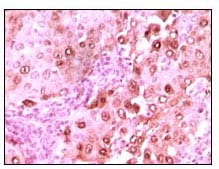
| WB | 咨询技术 | Human,Mouse,Rat |
| IF | 咨询技术 | Human,Mouse,Rat |
| IHC | 咨询技术 | Human,Mouse,Rat |
| ICC | 技术咨询 | Human,Mouse,Rat |
| FCM | 咨询技术 | Human,Mouse,Rat |
| Elisa | 1/5000-1/10000 | Human,Mouse,Rat |
| Aliases | S100A6; 2A9; PRA; 5B10; CABP; CACY |
| Entrez GeneID | 6277 |
| clone | 7D11 |
| Host/Isotype | Mouse IgG1 |
| Antibody Type | Primary antibody |
| Storage | Store at 4°C short term. Aliquot and store at -20°C long term. Avoid freeze/thaw cycles. |
| Species Reactivity | Human |
| Immunogen | Purified recombinant fragment of calcyclin expressed in E. Coli. |
| Formulation | Purified antibody in PBS with 0.05% sodium azide |
+ +
以下是关于ONECUT1抗体的3篇参考文献,按文献名称、作者和摘要内容简要概括:
---
1. **文献名称**:*ONECUT1 regulates the development of the fetal pancreas*
**作者**:Pierre Jacquemin, Greta Vanhoutteghem, Christine Durviaux
**摘要**:研究利用ONECUT1抗体进行免疫组化染色,发现ONECUT1在小鼠胚胎胰腺发育中调控内分泌细胞分化,敲除后导致胰岛素和胰高血糖素表达异常。
2. **文献名称**:*ONECUT1 is a key transcriptional regulator of adult hepatic functions*
**作者**:Taro Yamamichi, Tetsuya Nakamura, Hiroshi Seno
**摘要**:通过ONECUT1抗体的ChIP-seq和Western blot分析,揭示ONECUT1在成年小鼠肝脏中维持代谢相关基因(如Cyp7a1)表达,缺失导致胆汁酸代谢紊乱。
3. **文献名称**:*ONECUT1 controls human hepatocyte identity via repression of proliferative genes*
**作者**:Mercedes Cereijo, Anne Dubart-Kupperschmitt
**摘要**:使用ONECUT1抗体的免疫荧光和流式分选,证明ONECUT1在人类肝细胞中抑制增殖基因、促进分化,过表达可增强原代肝细胞功能。
---
以上文献均聚焦于ONECUT1抗体在发育生物学和疾病机制中的应用,涵盖胰腺、肝脏等器官的功能研究。
The ONECUT1 antibody is a crucial tool for studying the ONECUT1 transcription factor, also known as Hepatocyte Nuclear Factor 6 (HNF6). ONECUT1 belongs to a family of DNA-binding proteins characterized by a single cut domain and a homeodomain, enabling sequence-specific gene regulation. It plays pivotal roles in organ development, particularly in the liver, pancreas, and nervous system. During embryogenesis, ONECUT1 regulates hepatocyte differentiation, pancreatic beta-cell maturation, and neurogenesis. In adults, it maintains metabolic homeostasis and tissue-specific gene expression. Dysregulation of ONECUT1 is linked to diseases like diabetes, liver fibrosis, and hepatocellular carcinoma.
Researchers use ONECUT1 antibodies primarily in techniques such as Western blotting, immunohistochemistry (IHC), and immunofluorescence (IF) to detect protein expression, localization, and dynamics in cells and tissues. These antibodies aid in exploring developmental pathways, disease mechanisms, and regenerative processes. For example, studies employ ONECUT1 antibodies to investigate beta-cell dysfunction in diabetes or liver regeneration post-injury. Commercially available antibodies are often raised in rabbits or mice, validated for specificity via knockout controls. Their application spans basic research, drug discovery, and translational studies, underscoring their importance in understanding ONECUT1’s dual roles in development and disease.
×